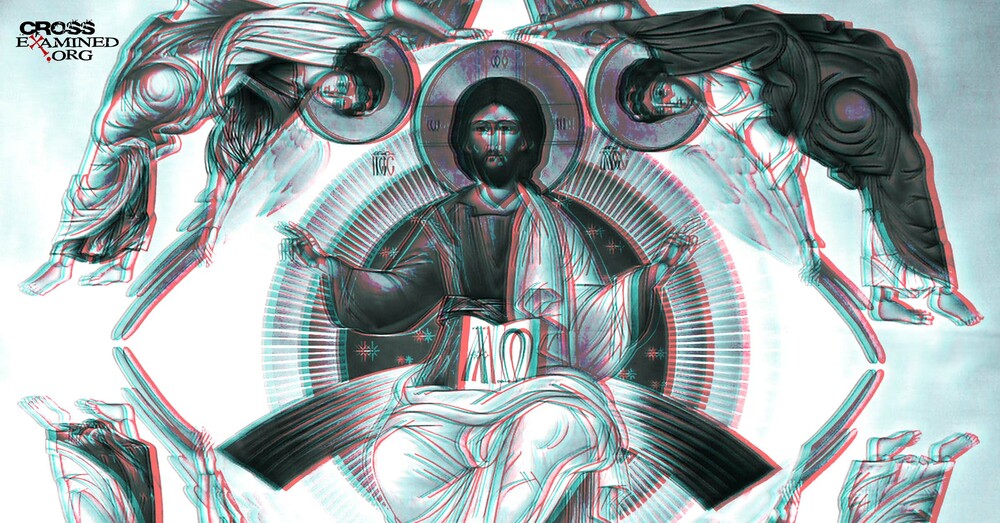In September of 1993, my grandmother, Eva Chilton, passed away from a long battle with congestive heart failure. She was the first of my grandparents to pass. My grandmother was a kind, loving woman who used to play board games with us grandchildren. Her smile was illuminating, and her laughter was infectious. Having grown up in church, my young ears heard numerous stories about the afterlife and divine promises. However, being the ever so skeptically minded person as I am, I wanted to know if those promises were true. How could I know that my grandmother was okay?

Previously, I had read a story in Guideposts magazine about a person who prayed that God would send a sign after their loved one’s passing to confirm that the loved one was okay. The article noted that God sent a lightning bolt to verify that the loved one was okay. My mind began to ponder that if the prayer worked for that person, surely it would also work for me. Thus, a few days before my grandmother’s passing, I asked the Lord to do the same for me. I asked for God to send a lightning bolt to assure me that my grandmother was okay when she passed. It was in late September which was not as conducive for lightning storms in the foothills of northwestern North Carolina, as opposed to the balmy, humid months of July and August. That is not to say that lightning storms never happen in late September, just that they are not as likely.
The day came when my grandmother passed. The family met in my grandparent’s home. It was an old house built in the early 1900s. The shutters were filled with asbestos insulation, fine as long as you do not perturb it. An old closet had been transformed into a bathroom, replacing the former outhouse used years before the home’s indoor plumbing was installed. The front of the home led into a large living room which was closed during the colder months due to the wood stove being on the other side of the home. A door led to a bedroom to the left. Across the living room was a door that led into a family room/bedroom. To the left of the family room was the kitchen which led out the back door. The kitchen and family room normally received the most traffic.
On this evening, I found myself in the quiet confines of the living room and peering outdoors into the empty darkness of the sorrowful September night. Everything seemed much darker on that evening because my grandmother was gone. However, the darkness would soon be replaced with brilliant colors of white and blue as two lightning bolts struck on either side of the house. A bolt hit near to where I was sitting, while another bolt hit on the other side of the home where my grandfather and Reverend Gilmer Denny, a pastor friend of the family, were sitting. Outside of losing power for a few brief seconds, nothing in the home was damaged. After a few minutes of initial shock, the Spirit of God reminded me of the prayer that had been previously appealed. At least to my teenage mind, the sign confirmed that my grandmother was just fine. She was in her heavenly home.
Even though this story is told 28 years after it occurred, the memory still vividly resonates in my mind because of the impact it made on me. In like manner, the resurrection of Christ impacts our theological framework. The apostle Paul taught that if the resurrection were not true, then people would be most pitied, the Christian message would be untrue, and Christian teachers would be found to be liars (1 Cor. 15:12-19). But if the resurrection is true, then, everything changes. Paul notes, “But as it is, Christ has been raised from the dead, the firstfruits of those who have fallen asleep. For since death came through a man, the resurrection of the dead also comes through a man. For just as in Adam all die, so also in Christ all will be made alive” (1 Cor. 15:20-22).[1] The resurrection’s veracity impacts the totality of a person’s theological worldview. Much could be said of this issue, but to constrain the article’s scope, only three theological areas of impact will be described.
The Resurrection Impacts the Theological Views of the Afterlife and Eternity
If the resurrection is true, then one has firsthand evidence that life exists beyond the grave. 1 Corinthians 15:20 holds that Jesus’s resurrection serves as the firstfruits for those who have already passed. The aspect of firstfruits refers to the Jewish practice of taking the first and best portion of a harvest and giving it to God.[2] The people were to bring the first sheaf of the harvest to the priest for him to wave the sheaf before God (Lev. 23:10-14). Figuratively, Jews understood that this taught them to place God first in all that they said and did. In the NT, it was understood that Jesus represented the best of us all. In like manner, just as Jesus had risen from the dead, so shall others be raised from the dead. Life exists beyond the scope of this world. The proof of the afterlife is found in an empty tomb and by the transformed lives who have encountered the One who defeated death.
The Resurrection Impacts the Theological Views of Purpose and Value
If there is a resurrection and an afterlife, then that must indicate that people have an innate purpose and value. God’s creation is important. Even more, the human race bears the divine imprint—otherwise known as the imagio Dei. As such, no life is a mistake. No person is without value and purpose. This writer spoke at a church on one occasion where a mother and father were in attendance, along with their numerous foster children. The mother said that because she was unable to bear children, she wanted to share her love with children who did not have parents. The message was on Jeremiah chapter one. The point was made that God foreknows each person before the person is born, just as was the case with the prophet Jeremiah. The point continued to note that because of God’s foreknowledge and calling, no one is worthless and without value. Furthermore, every life has a purpose. One of the children began crying as she looked at her mother. The mother wrapped her arm around the child. After the service, the mother expressed her appreciation to me for the message. She said that the child’s biological mother had told her that she was a mistake and was worthless. However, the mother emphasized that God had given her a purpose in this life and that her life was highly valued.
The resurrection of Christ confirms the value and worth of each person. If the resurrection is true, then, retrospectively, the atoning sacrifice of the cross is confirmed, and the mission of Christ is validated. The resurrection is God’s stamp of approval for the mission of Christ. The mission of Christ is evidence of God’s benevolent love and compassion for all of humanity. For Christ was not sent to condemn the world, but rather that the world through him might be saved (John 3:17)—emphasis again on the world, not just the frozen chosen.
The Resurrection Impacts the Theological Views of Ethics and Virtue
If the resurrection confirms that there is an afterlife and that human beings hold purpose and value, then, practically, the resurrection impacts ethics and value. If the resurrection is true, then how people treat one another matters. Why? Because the resurrection confirms the message of Jesus. Ben Witherington notes that “Jesus expected his audience to respond to his works in faith and with repentance. This suggests that his duty was more than just performing acts of compassion. Rather, he was calling God’s people back to their source in view of the inbreaking dominion of God … the power of God must be used to help people.”[3] Jesus commanded his disciples to love others and to even pray for those with whom they differ (Matt. 5:44). Doing good for others is not only commanded and exhibited by Jesus, but it also illustrates the kingdom of God to those in need and compels others to enter this domain.
This article comes on the heels of seven months spent in clinical chaplaincy ministry. Quite honestly, God’s power has been exhibited more in these past seven months than was personally experienced in the past 20 years of pastoral ministry. Prayers have been answered in remarkable ways; people have expressed their deepest appreciation for the work being done; people have had encounters with God; and souls have come to know the Lord. Those things occur in pastoral ministry, but not to the level that has been witnessed in chaplaincy ministry. Why is that? Perhaps it is because chaplains find themselves on the front lines of ministry. Rather than sitting in an office, quarantined from the quagmire of human experience, the chaplain finds oneself in the trenches with those most in need. Chaplaincy has taught the value of Jesus’s teaching, firsthand, that when a cup of water, or a good deed, is given to one who thirsts, it is also given to Jesus (Mark 9:41). This is not to discredit pastoral ministry in the least. I have many fond memories of the pastorate. Who knows? God may use me there again in the future. Nonetheless, the point simply advocates that to demonstrate the love of God, believers must be willing to serve those most in need without judgment. In other words, believers must be willing to get their hands dirty. Christ died and defeated death to give life to humanity. That means that every person is worth saving. That also means that every person is of dignity, worth, and value. The book of Revelation portrays a scene where individuals from every tribe, nation, and tongue surround the throne of God while giving him praise (Rev. 7:9). If true, then the resurrection allows no room for racism or favoritism based on socioeconomic standards. The resurrection demands a superior ethical and moral code to be held by each believer.
Conclusion
The article began with a story of a lightning bolt that fixated my attention heavenward. Later in life, two other lightning bolt experiences transformed my life. The final experience will be shared another day. Insofar as this article goes, the second lightning bolt experience occurred when the resurrection of Jesus was understood to be a historical fact. My life has been transformed just as has the lives of countless others. The resurrection not only serves as the linchpin for the Christian worldview, but it also validates the entire theological framework upon which the biblical worldview is built. Christians may differ on modes of baptism, Bible translations, and styles of singing. However, a Christian cannot deny the historical resurrection of Christ. If the resurrection is denied, then the entire foundation for the Christian worldview collapses, and the walls come tumbling down. Paul verifies that very line of thought in 1 Corinthians 15. Yet if the resurrection did occur, then everything changes. A person may find it revolutionary to acknowledge that Jesus’s resurrection is not some comic book tale told on framed color-filled pages. Jesus’s resurrection is a historical fact that validates the afterlife, ethical values, and human purpose. The world’s woes will not be solved by political pundits and legislation. Rather, the solution is found in an empty tomb and on an occupied throne at the right hand of God the Father. But one day, the throne will be unoccupied as numerous other tombs are left emptied. That is all because the resurrection is true.
Notes:
[1] Unless otherwise noted, all quoted Scripture comes from the Christian Standard Bible (Nashville, TN: Holman, 2017).
[2] A. Boyd Luter, “Firstfruits,” The Lexham Bible Dictionary, John D. Barry, ed, et al (Bellingham, WA: Lexham Press, 2016).
[3] Ben Witherington, III, The Christology of Jesus (Minneapolis, MN: Fortress, 1990), 176.
Recommended resources related to the topic:
Early Evidence for the Resurrection by Dr. Gary Habermas (DVD), (Mp3) and (Mp4)
Jesus, You and the Essentials of Christianity by Frank Turek (INSTRUCTOR Study Guide), (STUDENT Study Guide), and (DVD)
Why We Know the New Testament Writers Told the Truth by Frank Turek (mp4 Download)
__________________________________________________________________________________________________________________________________________________
Brian G. Chilton is the founder of BellatorChristi.com, the host of The Bellator Christi Podcast, the author of the Layman’s Manual on Christian Apologetics, and a Ph.D. Candidate of the Theology and Apologetics program at Liberty University. He received his Master of Divinity in Theology from Liberty University (with high distinction); his Bachelor of Science in Religious Studies and Philosophy from Gardner-Webb University (with honors); and received certification in Christian Apologetics from Biola University. Brian is a member of the Evangelical Theological Society and the Evangelical Philosophical Society. Brian has served in pastoral ministry for nearly 20 years and currently serves as a clinical chaplain.
Original Blog Source: https://bit.ly/2YM918l

















Facebook Comments